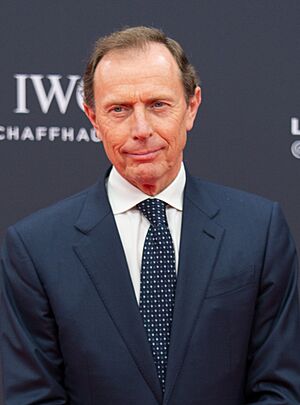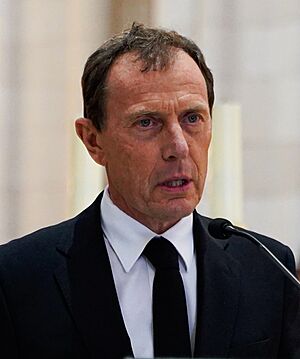Emilio Butragueño facts for kids

Butragueño in 2024
|
|||||||||||||
| Personal information | |||||||||||||
|---|---|---|---|---|---|---|---|---|---|---|---|---|---|
| Full name | Emilio Butragueño Santos | ||||||||||||
| Date of birth | 22 July 1963 | ||||||||||||
| Place of birth | Madrid, Spain | ||||||||||||
| Height | 1.70 m (5 ft 7 in) | ||||||||||||
| Position(s) | Striker | ||||||||||||
| Youth career | |||||||||||||
| Casariche | |||||||||||||
| 1981–1982 | Real Madrid | ||||||||||||
| Senior career* | |||||||||||||
| Years | Team | Apps | (Gls) | ||||||||||
| 1982–1984 | Real Madrid B | 65 | (37) | ||||||||||
| 1984–1995 | Real Madrid | 341 | (123) | ||||||||||
| 1995–1998 | Celaya | 91 | (29) | ||||||||||
| Total | 497 | (189) | |||||||||||
| International career | |||||||||||||
| 1983–1984 | Spain U21 | 5 | (2) | ||||||||||
| 1984 | Spain amateur | 1 | (1) | ||||||||||
| 1984–1992 | Spain | 69 | (26) | ||||||||||
|
Medal record
|
|||||||||||||
| *Club domestic league appearances and goals | |||||||||||||
Emilio Butragueño Santos, born on July 22, 1963, is a famous Spanish former professional footballer. He played as a striker, which means he was mainly responsible for scoring goals.
He is best known for his time playing for Real Madrid, one of the biggest football clubs in the world. People nicknamed him El Buitre, which means "The Vulture". He was part of a famous group of players called La Quinta del Buitre (The Vulture's Cohort). This group included his teammates Manolo Sanchís, Rafael Martín Vázquez, Míchel, and Miguel Pardeza.
Butragueño scored 123 goals in 341 games for Real Madrid in the La Liga (Spain's top football league) over 12 seasons. He also played for the Spanish national team in two World Cups and two European Championships. He scored 26 goals for his country, a record that stood for many years.
Contents
His Club Football Journey
In 1981, Emilio Butragueño joined the youth system of Real Madrid. He first played for their reserve team, Real Madrid B. His big moment came on February 5, 1984, when he made his first team debut. The legendary coach Alfredo Di Stéfano gave him the chance to play against Cádiz CF.
Butragueño made an amazing start. Real Madrid was losing 2-0, but he scored two goals and helped set up another. This helped his team win the game 3-2! Later that year, on December 12, he played his first game in a European competition. He scored three goals in a 6-1 win against R.S.C. Anderlecht in the UEFA Cup. Real Madrid went on to win this competition that season.
During the 1980s, Butragueño was a key player for Real Madrid. He helped the team win many trophies. He won the European Bronze award for best footballer two years in a row. In 1991, he won the Pichichi Trophy for being the top scorer in La Liga. He also helped Real Madrid win five La Liga titles, two Copa del Rey cups, and two UEFA Cups in a row.
In June 1995, Butragueño left Real Madrid. He had played fewer games that season, partly because a young player named Raúl was becoming very good. Butragueño then joined Atlético Celaya in Mexico. In his first year there, his team reached the final of the Liga MX. He played for three seasons in Mexico and was known as the "Gentleman of the Pitch." This was because he never received a single red card in his entire career! He retired from playing football in April 1998.
Representing His Country
Emilio Butragueño played 69 games for the Spanish national team and scored 26 goals. His first game for Spain was on October 17, 1984, against Wales. Spain won that game 3-0, and he scored the final goal. He was also part of the Spanish team that finished second in the UEFA Euro 1984 tournament.
Butragueño played a big role in the 1986 FIFA World Cup. He scored four goals in one game as Spain beat Denmark 5-1 in the round of 16. He also played in the 1990 World Cup in Italy.
After Football: A New Role
After he stopped playing, Butragueño continued to be involved in football. On October 19, 2004, he became the director of football for Real Madrid. He also served as the club's vice-president until the end of the 2005–06 season. Since then, he has been the head of public relations for Real Madrid. This means he helps manage the club's image and relationships with the public.
Even when he was still a player, a computer game was released in 1988 that was named after him. It was available on popular computer systems like the Amstrad CPC, Commodore 64, ZX Spectrum, and MSX.
Awards and Trophies
Real Madrid B
- Segunda División: 1983–84
Real Madrid
- La Liga: 1985–86, 1986–87, 1987–88, 1988–89, 1989–90, 1994–95
- Copa del Rey: 1988–89, 1992–93
- Copa de la Liga: 1985
- Supercopa de España: 1988, 1989, 1990, 1993
- UEFA Cup: 1984–85, 1985–86
- Copa Iberoamericana: 1994
Spain
- UEFA European Championship runner-up: 1984
Spain Under-21
- UEFA Under-21 European Championship runner-up: 1984
Individual
- Bravo Award: 1985, 1986
- Ballon d'Or third place: 1986, 1987
- Pichichi Trophy: 1990–91
- FIFA World Cup Silver Boot: 1986
- FIFA World Cup All-Star Team: 1986
- Guerin Sportivo All-Star Team: 1986
- FIFA 100
See also
 In Spanish: Emilio Butragueño para niños
In Spanish: Emilio Butragueño para niños
 | Aurelia Browder |
 | Nannie Helen Burroughs |
 | Michelle Alexander |


